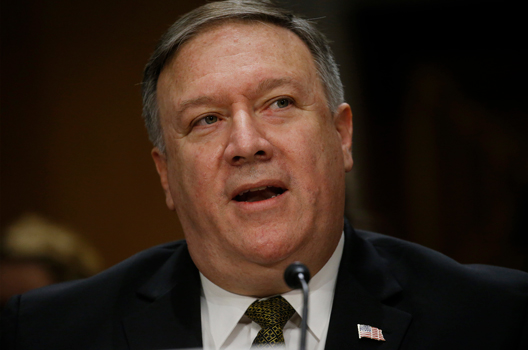 The US Senate on April 26 confirmed former Director of the Central Intelligence Agency Mike Pompeo as the new US Secretary of State.
The US Senate on April 26 confirmed former Director of the Central Intelligence Agency Mike Pompeo as the new US Secretary of State.
US President Donald J. Trump picked Pompeo, a known foreign policy hawk on issues from Russia to Iran to North Korea, to replace Rex Tillerson at the State Department on March 13.
Atlantic Council analysts and experts weighed in on the confirmation, including its implications for US-Iranian relations.
Rachel Brandenburg, director of the Middle East Security Initiative in the Scowcroft Center for Strategy and Security:
“Secretary Pompeo has not been shy about his disdain for the Iran nuclear deal. We also know he has been perceived as very loyal to the president. It is worth considering, however, that while today he takes on a new position in Trump’s cabinet, he is not new to the Trump administration or cabinet-level deliberations therein. As director of the CIA, Pompeo was among Trump’s advisers on key national security decisions, including those presumably related to Iran. While we can assume Pompeo will retain the ear of the president and we can expect to see him take on a more publicly diplomatic role than he had as CIA director, we shouldn’t assume he will automatically shift the balance of the debate on key national security decisions, this one included. Ultimately, what happens on May 12 will be up to the president. From what we’ve seen and heard to date, including over the past few days, Trump wants to keep us guessing until he alone has made up his mind. I expect Pompeo will fall in line to support the president’s decision wherever it ends up.”
David Mortlock, nonresident senior fellow in the Global Energy Center:
“An imminent test for Pompeo will be the looming May 12 deadline for a waiver of key Iran sanctions to continue US implementation of the JCPOA. While he was noncommittal during his confirmation testimony, his past opposition to the deal is well documented, and he must advise the president whether to renew the waiver on May 12 or renege on the US obligations. If the president does refuse to renew that waiver, the sanctions could force other governments to choose whether to reduce their oil purchases from Iran or have their banks cut off from the United States for dealing with Iran’s Central Bank. Pompeo could face a confrontation with Europe, Russia, and China over the JCPOA within his first couple of weeks on the job, which will only get more challenging as critical sanctions waiver renewals are due in early July.”
Barbara Slavin, director of the Future of Iran Initiative:
“As a congressman and CIA director, Mike Pompeo has been extremely critical of the Iran nuclear deal. However, I believe his perspective may change as secretary of state. He has allowed Policy Planning Director Brian Hook to continue conversations with Europeans about a supplemental understanding on the Iran nuclear deal. And Pompeo will be meeting, starting tomorrow in Brussels, with US allies that are firmly committed to the landmark non-proliferation accord.
“During his confirmation hearings, Pompeo expressed support for diplomacy on the Iran issue. He should build on the Joint Comprehensive Plan of Action and join with Defense Secretary James Mattis to convince Trump to stick with the deal and renew US nuclear-related sanctions on May 12.”
Get all the reactions at the New Atlanticist.
Image: Former CIA Director Mike Pompeo testifies before a Senate Foreign Relations Committee confirmation hearing on Pompeo’s nomination to be secretary of state on Capitol Hill in Washington, DC, US, April 12, 2018. (REUTERS/Leah Millis)
